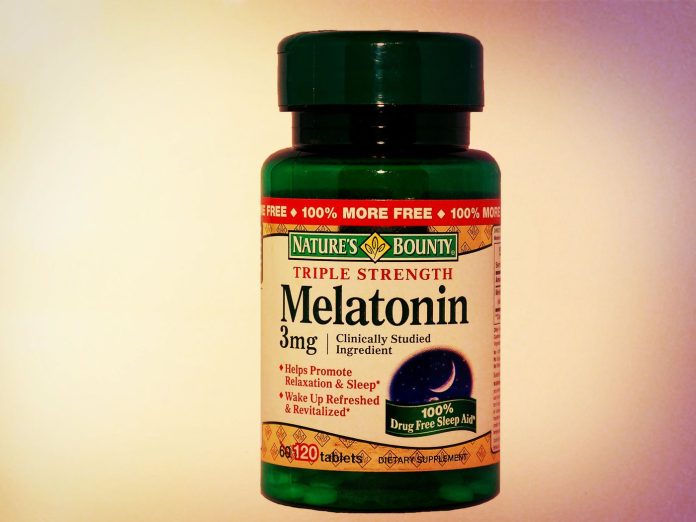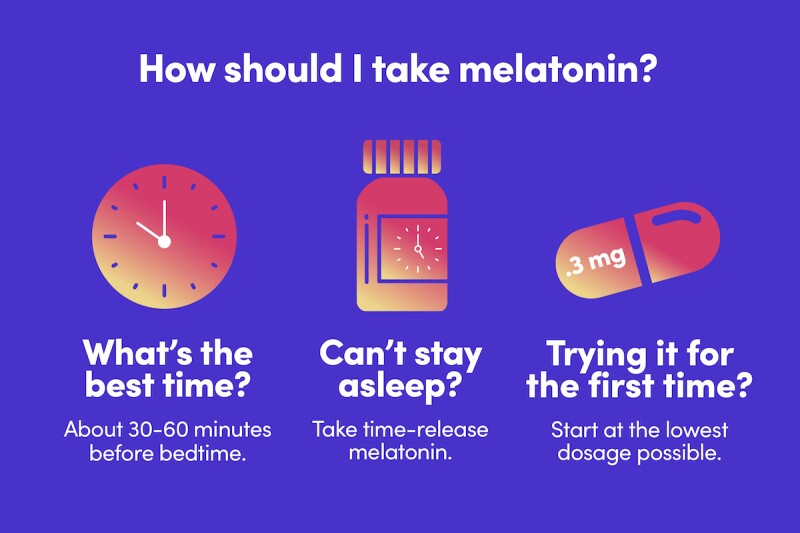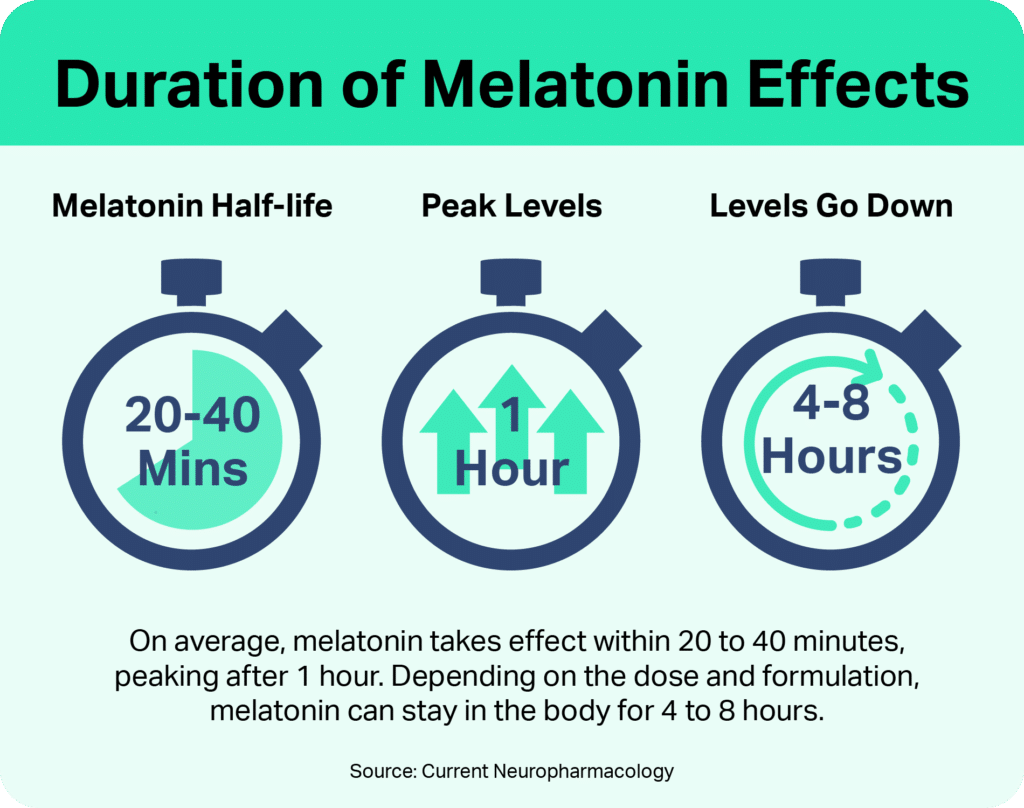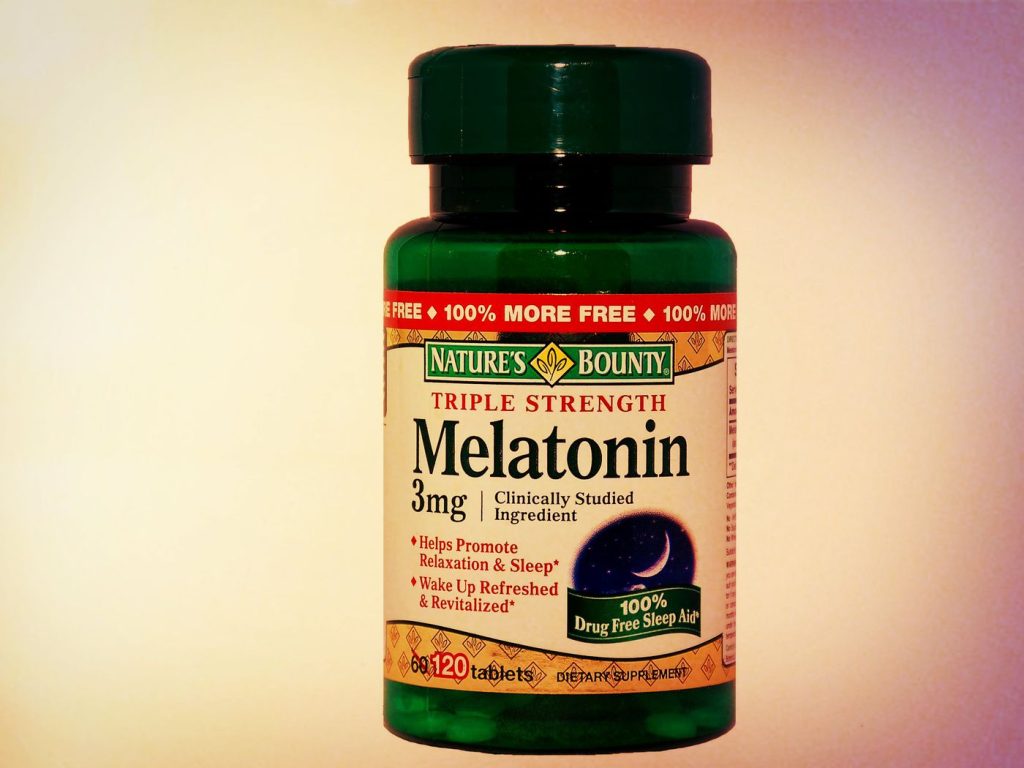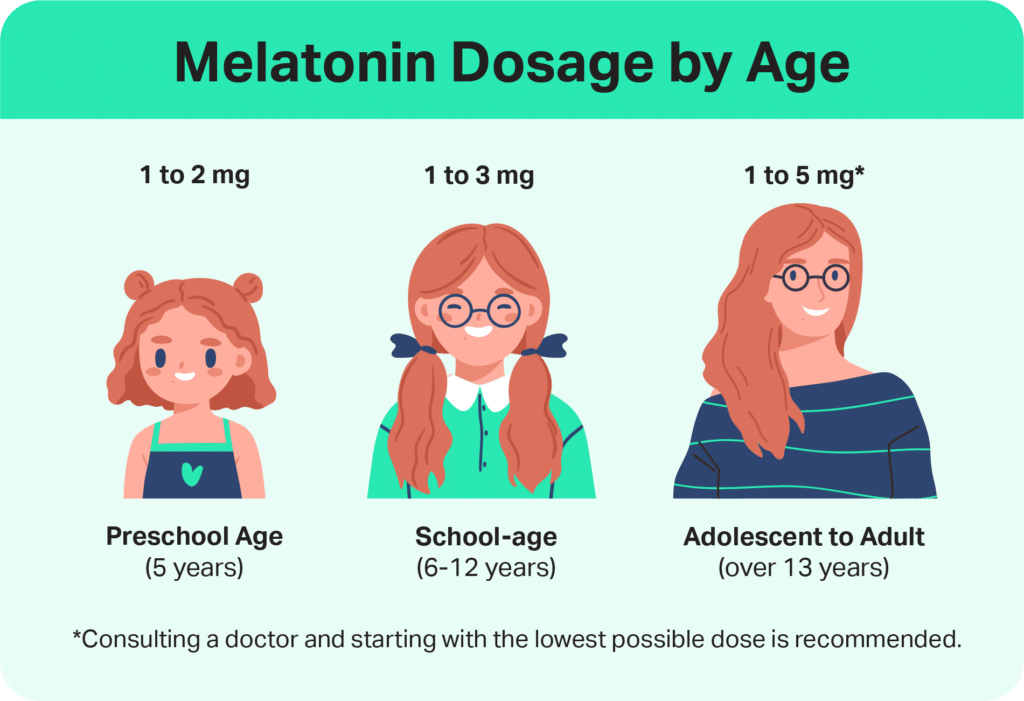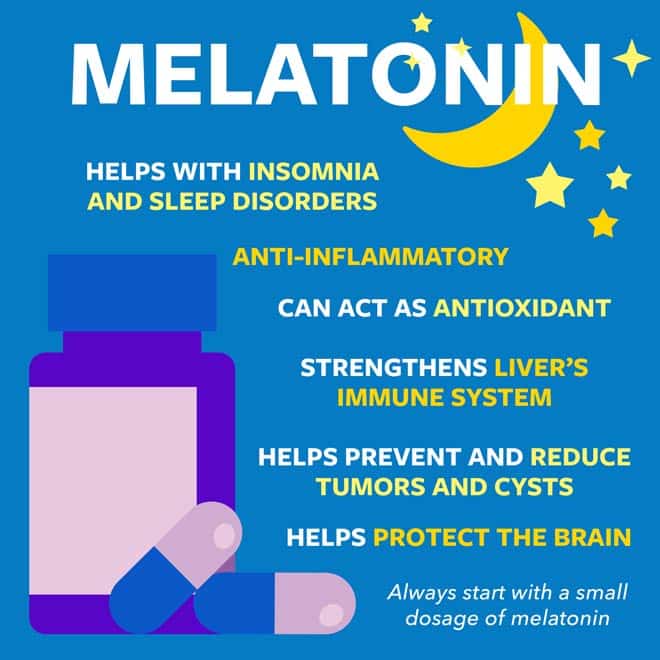Suppose you’ve ever found yourself tossing and turning in bed, desperately searching for a way to drift off peacefully into dreamland. In that case, whether or not to take melatonin supplements for sleep has probably crossed your mind.
We’ve all been there, desperately yearning for a good night’s rest and wondering if these tiny pills could hold the key to unlocking the sweet slumber we crave.
In this article, we’ll take a closer look at melatonin supplements, exploring their potential benefits, potential side effects, and overall effectiveness so you can make an informed decision and bid your sleepless nights farewell once and for all.
Review contents
What is melatonin?
Definition and role in the body
Melatonin is a hormone naturally produced by the pineal gland in the brain. It plays a crucial role in regulating the sleep-wake cycle, also known as the circadian rhythm. Melatonin signals to our body that it is time to sleep, helping us fall asleep faster. It is often called the “sleep hormone” because it is vital in promoting restful sleep.
Sources of melatonin
Melatonin is naturally produced in the body but can also be found in certain foods. Foods such as cherries, nuts, seeds, and grains contain small amounts of melatonin. However, the levels of melatonin in these foods are usually not sufficient to have a significant impact on sleep. Therefore, a melatonin supplement may be a more practical option if you want to increase your melatonin levels.
Understanding sleep disorders
Different types of sleep disorders
Sleep disorders can encompass a wide range of issues that affect the quantity and quality of sleep. Some common sleep disorders include insomnia, sleep apnea, restless leg syndrome, and narcolepsy. Insomnia is characterized by difficulty falling or staying asleep, while sleep apnea is a disorder where breathing is interrupted during sleep. Restless leg syndrome causes an uncontrollable urge to move the legs, often leading to sleep disturbances. Narcolepsy, on the other hand, is a neurological disorder that causes excessive daytime sleepiness and sudden sleep attacks.
Symptoms and causes
Sleep disorders can manifest in various ways, but some common symptoms include difficulty falling asleep, staying asleep, or waking up too early. Other symptoms may include daytime sleepiness, irritability, lack of concentration, and impaired performance. The causes of sleep disorders can vary depending on the specific condition. Factors such as stress, anxiety, lifestyle choices, medications, and underlying health conditions can all contribute to the development of sleep disorders.
Impact on overall health
Sleep disorders can have a significant impact on overall health and wellbeing. Chronic sleep deprivation can weaken the immune system, increase the risk of developing chronic diseases such as diabetes and heart disease, impair cognitive function and decision-making abilities, and negatively affect mood and mental health. It is crucial to address sleep disorders promptly to prevent potential long-term health consequences.
This image is the property of sleep.brightspotcdn.com.
Melatonin and sleep regulation
How melatonin affects sleep
Melatonin plays a crucial role in regulating the sleep-wake cycle. When daylight begins to fade, the pineal gland releases melatonin, signaling the body that it is time to sleep. This release of melatonin helps to decrease alertness and promote relaxation, making it easier to fall asleep. Melatonin also helps to regulate the duration and quality of sleep, ensuring that we get restorative sleep throughout the night.
Circadian rhythm and melatonin production
Our internal biological clock, known as the circadian rhythm, regulates the timing of specific physiological processes, including the sleep-wake cycle. The circadian rhythm is influenced by external cues such as light and darkness. When exposed to darkness, the pineal gland increases melatonin production, signaling to the body that it is nighttime and time to sleep. Exposure to bright morning light helps suppress melatonin production and promote wakefulness.
Melatonin sensitivity
Individuals may vary in their sensitivity to melatonin. Some individuals may be more sensitive to the effects of melatonin and find that even small doses of supplements help regulate their sleep. Others may not experience significant benefits from melatonin supplementation. It is essential to consider individual variation and work with a healthcare professional to determine the appropriate dosage and timing for optimal effectiveness.
Benefits of melatonin supplements
Promoting sleep duration
One of the primary benefits of melatonin supplements is their ability to promote a longer sleep duration. By regulating the sleep-wake cycle and promoting relaxation, melatonin supplements can help individuals fall asleep faster and stay asleep throughout the night. This can result in feeling more rested and energetic during the day.
Improving sleep quality
In addition to promoting sleep duration, melatonin supplements have been found to improve sleep quality. Studies have shown that melatonin can enhance deep sleep, also known as slow-wave sleep, which is crucial for physical restoration and cognitive function. Melatonin supplements can improve health and wellbeing by enhancing sleep quality.
Adjusting sleep-wake cycle
Melatonin supplements can benefit individuals who need to adjust their sleep-wake cycle, such as those suffering from jet lag or shift work. Taking melatonin supplements at specific times can help synchronize the internal body clock with the desired sleep schedule, making it easier to fall asleep and wake up at the desired times.
Reducing jet lag symptoms
Traveling across time zones can disrupt the body’s internal clock, resulting in symptoms of jet lag. Melatonin supplements can help alleviate the symptoms of jet lag by assisting in readjusting the sleep-wake cycle more quickly. By taking melatonin at the appropriate time for the destination’s time zone, travelers can minimize the effects of jet lag and adjust to the new time zone more smoothly.
This image is the property of www.sleepfoundation.org.
Dosage and timing
Recommended melatonin dosage
The appropriate melatonin dosage can vary depending on the individual and the specific sleep issue. It is advisable to start with a low dosage, typically around 0.5 to 1 milligram, and gradually increase if necessary. Higher dosages, such as 3 to 5 milligrams, may be recommended for individuals with more severe sleep disturbances. However, it is crucial to consult with a healthcare professional to determine the appropriate dosage for your specific needs.
Timing for optimal effectiveness
The timing of melatonin supplementation is essential for its effectiveness. Melatonin should be taken approximately 1 to 2 hours before bedtime to allow sufficient time for it to be absorbed and start taking effect. Taking melatonin too close to bedtime may not provide the benefits of falling asleep faster. It is advisable to follow the recommended timing guidelines a healthcare professional provides to ensure optimal effectiveness.
Safety considerations
Potential side effects
Melatonin is generally considered safe for short-term use when taken at appropriate doses. However, some individuals may experience side effects such as daytime sleepiness, dizziness, headaches, and stomach discomfort. These side effects are typically mild and resolve on their own. It is essential to monitor your response to melatonin supplements and discontinue use if any adverse effects persist or worsen.
Interactions with medications
Melatonin supplements can interact with certain medications, potentially affecting their effectiveness. It is essential to speak with a healthcare professional before starting melatonin supplements, especially if you are taking any prescription medications. They can advise on possible interactions and determine the best course of action for your specific situation.
Precautions for specific health conditions
Individuals with certain health conditions should exercise caution when considering melatonin supplements. Pregnant or breastfeeding women, individuals with autoimmune disorders, seizure disorders, or bleeding disorders, and those taking blood-thinning medications should consult with a healthcare professional before starting melatonin supplements. Prioritizing safety and discussing any underlying health conditions is crucial before incorporating melatonin into your sleep routine.
This image is the property of cdn.vox-cdn.com.
Effectiveness and limitations
Research on melatonin supplements
Numerous studies have investigated the effectiveness of melatonin supplements in promoting better sleep. Research has shown that melatonin can improve sleep duration and quality and adjust the sleep-wake cycle. However, it is essential to note that individual responses to melatonin can vary, and more research is needed to fully understand its long-term effects and optimal usage.
Individual variability in response
While melatonin can be effective for many individuals, it is essential to recognize variability in individual responses. Some individuals may find melatonin supplements highly effective in regulating sleep, while others may not experience significant benefits. Factors such as age, overall health, and the underlying cause of sleep disturbances can influence how an individual responds to melatonin supplements.
Limitations and potential placebo effect
It is essential to acknowledge the limitations of melatonin supplements. While they can be a valuable tool for improving sleep, they are not a cure-all for sleep disorders. They may not address the underlying causes of sleep disturbances and should be used with other lifestyle changes and interventions. Additionally, the placebo effect may play a role in the perceived benefits of melatonin supplements. It is essential to approach melatonin supplements with realistic expectations and consider other alternatives if necessary.
Alternatives to melatonin supplements
Sleep hygiene practices
In addition to considering melatonin supplements, adopting healthy sleep hygiene practices can significantly improve sleep quality. Establishing a consistent sleep schedule, creating a relaxing bedtime routine, optimizing the sleep environment, avoiding stimulants close to bedtime, and engaging in regular physical activity can all contribute to better sleep. Prioritizing these practices and creating a conducive sleep environment before taking supplements is essential.
Natural remedies
Some individuals prefer to explore natural remedies as an alternative to melatonin supplements. Herbal supplements such as valerian root and chamomile tea are known for their calming properties and potential sleep-enhancing effects. Additionally, relaxation techniques like meditation, deep breathing exercises, and aromatherapy can help promote relaxation and improve sleep quality.
Cognitive-behavioral therapy for insomnia
For individuals with chronic insomnia or other sleep disorders, cognitive-behavioral therapy for insomnia (CBT-I) may be a highly effective alternative to melatonin supplements. CBT-I is a non-pharmacological approach that addresses cognitive and behavioral factors contributing to sleep disturbances. It focuses on identifying and modifying negative sleep patterns and thoughts, implementing relaxation techniques, and improving sleep hygiene practices. CBT-I has been shown to have long-term benefits and can help individuals develop sustainable sleep habits.
This image is the property of www.sleepfoundation.org.
Consulting a healthcare professional
Advice from a doctor or sleep specialist
When considering melatonin supplements or other interventions for sleep disorders, it is crucial to consult with a healthcare professional. A doctor or sleep specialist can evaluate your sleep patterns, assess any underlying health conditions, and provide personalized recommendations. They can help determine the appropriateness of melatonin supplements, address potential risks or interactions, and guide you in making informed decisions regarding your sleep health.
Evaluation of individual sleep patterns
Healthcare professionals will often evaluate an individual’s sleep patterns to determine the most appropriate sleep intervention. This may involve keeping a sleep diary, undergoing a sleep study, or using wearable devices to track sleep quality and quantity. By understanding your unique sleep patterns, healthcare professionals can tailor recommendations to address your specific needs.
Determining the need for melatonin supplementation
A healthcare professional can help determine whether melatonin supplementation is necessary based on your sleep patterns, underlying health conditions, and the severity of your sleep disturbances. They will consider factors such as sleep quality, sleep duration, and overall daytime functioning to determine whether melatonin supplements are likely beneficial. They can also guide dosage, timing, and duration of supplementation to ensure optimal effectiveness.
Conclusion
When considering whether to take melatonin supplements for sleep, weighing the pros and cons, considering personal considerations, and making an informed decision is essential. Melatonin supplements can help promote sleep duration, improve sleep quality, and adjust the sleep-wake cycle. However, individuals should be aware of potential side effects, interactions with medications, and limitations of melatonin supplements.
Exploring alternatives such as sleep hygiene practices, natural remedies, and cognitive-behavioral therapy for insomnia may also be beneficial. Consulting with a healthcare professional can provide personalized guidance and help determine the most appropriate course for improving sleep health. Individuals can make informed decisions to enhance their sleep and overall wellbeing with careful consideration and professional advice.
This image is the property of www.medicalmedium.com.
Nature Made Melatonin 5mg Extra Strength Tablets, 100% Drug Free Sleep Aid for Adults, 90 Tablets, 90 Day Supply
$7.34 in stock
Features
- Sleep support supplement: Contains one 90 count bottle of Nature Made Melatonin 5 mg Extra Strength Tablets for a 90-day supply
- Melatonin is a hormone found naturally in the body that helps to regulate sleep and wake cycles
- Each Nature Made 5 mg Melatonin Tablet helps you fall asleep faster and supports restful sleep
- Adults take one of these Melatonin 5mg sleep supplements one hour before bedtime with water; do not exceed 2 tablets daily
- These Nature Made Melatonin Tablets are 100% drug free, gluten free, non habit forming, and have no color added, no artificial flavors, and no preservatives
Natrol Melatonin 5mg, Strawberry-Flavored Dietary Supplement for Restful Sleep, 200 Fast-Dissolve Tablets, 200 Day Supply
$11.11 in stock
Features
- Get Enough Sleep: Sleep enhances immune defense and a lack of it can affect the immune system; Studies have shown how people who don't get enough sleep have a higher risk of illness, and it can also impact the time it takes for the body to recover
- Sleep Strengthens Your Immune System: Research has shown the importance of sleep in strengthening your immune system, improving mental sharpness, maintaining balanced moods and so much more; Natrol Melatonin is a solution for occasional sleeplessness
- Fast Dissolve Tablets: Natrol’s unique fast dissolve strawberry formula enables faster absorption that can be taken anytime, anywhere; No water needed
Nature Made Melatonin 3mg Tablets, 100% Drug Free Sleep Aid for Adults, 240 Tablets, 240 Day Supply
$9.29 in stock
Features
- Sleep support supplement: Contains one 240 count bottle of Nature Made Melatonin 3 mg Tablets for a 240-day supply
- Melatonin is a hormone found naturally in the body that helps to regulate sleep and wake cycles
- Each Nature Made 3 mg Melatonin Tablet helps you fall asleep faster and supports restful sleep with a lower dose Melatonin tablet
- Adults take one of these Melatonin 3mg sleep supplements one hour before bedtime with water
- These Nature Made Melatonin Tablets are 100 percent drug free, gluten free, non habit forming, and have no color added, no artificial flavors, and no preservatives
Nature Made Melatonin 10mg Maximum Strength Tablets, 100% Drug Free Sleep Aid for Adults, 70 Count, 70 Day Supply
$8.27 in stock
Features
- Maximum strength(1) sleep support supplement: Contains one 70 count bottle of Nature Made Melatonin 10 mg Maximum Strength(1) Tablets for a 70-day supply
- This sleep supplement contains Melatonin, a hormone found naturally in the body that helps to regulate sleep and wake cycles
- These Melatonin tablets help you fall asleep faster and support restful sleep
- Adults take one maximum strength(1) Melatonin 10mg tablet one hour before bedtime with water, and do not exceed one of these Melatonin 10 mg tablets daily
- These gluten free Melatonin supplements have no color added, no artificial flavors, no preservatives and are 100% drug free
Puritan's Pride Super Strength Rapid Release Capsules Melatonin 120 Count (Pack of 2)
$12.20 in stock
Features
- Helps improve quality of rest
- Nutritionally supports sound sleep
- Fall asleep faster, stay asleep longer
- Convenient 2 Pack
Natrol Melatonin 5mg, Dietary Supplement for Restful Sleep, 90 Strawberry-Flavored Gummies, 90 Day Supply
$8.34 in stock
Features
- FALL ASLEEP FASTER: Natron Melatonin 5 mg Gummies are a nighttime sleep aid. Melatonin is naturally produced by our bodies to help manage sleep cycles, but its balance can be easily disrupted. It helps you fall asleep faster, stay asleep longer, and wake up feeling refreshed. *
- Product Note: Exposure to heat or sunlight may lead to melting/damage of product. Hence customers are expected to be available during the product delivery
- NON-GMO: Natron Gummies are non-GMO, made with organic sweeteners, and are free of artificial flavors, sweeteners, colors or preservatives.
- GELATIN-FREE & VEGETARIAN: Natron Gummies are pectin based and contain no gelatin, so they are less likely to stick to teeth than standard gelatin gummies. The gummies are available in a great-tasting strawberry flavor. *
- #1 MELATONIN BRAND: Natron is the #1 Melatonin brand in America and one of the nation’s leading manufacturers of vitamins and supplements.
Carlyle Melatonin 12 mg Fast Dissolve 180 Tablets | Drug Free | Natural Berry Flavor | Vegetarian, Non-GMO, Gluten Free
$8.29 in stock
Features
- ULTRA SUPPORT: Carlyle Melatonin is delivered in convenient 12 mg fast dissolve tablets
- OPTIMAL FORM: Fast-dissolve tablets deliver 12 mg of Melatonin with natural berry flavor
- ROOTED IN WELLNESS: Carlyle provides premium, honest supplements in your pursuit to healthy living
- CARLYLE MANUFACTURERS: Laboratory Tested, Trusted Ingredients, Superior Quality, 100% Guaranteed!
- NATURALLY FREE OF: Gluten, Yeast, Milk, Lactose, Artificial Flavor

